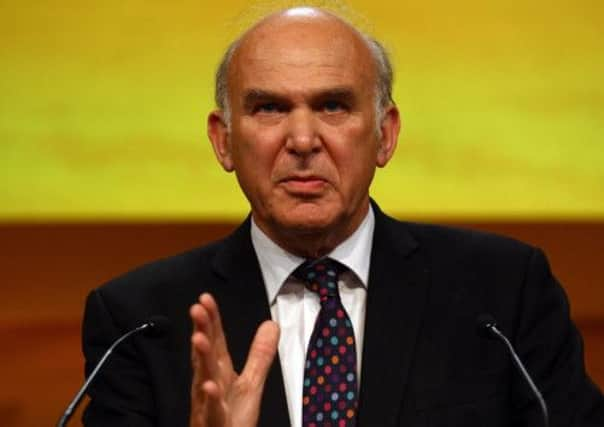Scottish Independence: Cable denies scaremongering


The Business Secretary said he was making the “unemotional” case for a “no” vote in next year’s referendum, as he unveiled a new paper suggesting that independence could “destabilise enterprise”, see an end to VAT relief on consumer goods and reduce cross-border movement between Scotland and England.
It came as he was forced to answer accusations of “scare-mongering” over the paper, which also warns that mobile phone roaming charges could be increased for Scottish residents – despite an EC bid to reduce and potentially scrap the unpopular penalties.
Advertisement
Hide AdAdvertisement
Hide AdDeputy First Minister Nicola Sturgeon said that the entire 129 paper should be pulled yesterday, but Mr Cable argued that the information it contained on roaming charges and other consequences of independence had been “balanced”.
Asked whether the UK campaign was too negative, he insisted: “It is perfectly sensible to have a grown-up debate that is unemotional. Of course there are consequences and it is right that we spell out some of those problems. We have to do that in a sensible grown up way”.”
The report, published by the Department for Business, Innovation and Skills, is the latest in a series of Whitehall papers on the consequences of independence.
While previous reports have focused on macro-economic issues such as the currency, the new paper examines detailed issues from mobile phone coverage and postal services to transport, regulation and the movement of labour.
It concluded that “a single market between two separate states is not the same as a fully integrated domestic market”.
“Divergence and fragmentation” between Scotland and the remaining parts of the UK would therefore eventually lead to higher costs and “prolonged uncertainties” for firms and consumers, it added.
Yes group’s PR chief ousted
THE pro-independence “Yes” campaign’s communications boss has been moved from her position after just ten months in the job.
Susan Stewart has stood down to move to a new “ambassadorial” role within the wider Yes Scotland campaign, which she said would allow her to “pursue other opportunities”.
Advertisement
Hide AdAdvertisement
Hide AdMs Stewart earlier served as Scotland’s first dedicated diplomat within the British embassy in Washington.
Yes Scotland also uses the Hay-McKerron media firm, which will continue running the campaign’s press operation.
Yes Scotland chief executive Blair Jenkins said that Ms Stewart’s move was part of changes that would see an increase in campaigning.
Small business backing for independence
MOST smaller Scottish firms are in favour of independence, a poll of businesses has indicated.
New research from AXA Business Insurance has revealed that 52 per cent of Scottish small and medium-sized businesses (SMEs) surveyed favour independence.
But the survey revealed that UK-wide, only one in four (25 per cent) of all those questioned believe that independence would be a good thing for small businesses in Scotland. A further 45 per cent believe it would not. The remaining 30 per cent are not sure either way. The study questioned around 500 SMEs across the UK
Nationalist MSP Kenneth Gibson welcomed the report. He said: “Business men and women know that deciding economic policies in Scotland means better policies for Scottish business. And with the full powers of independence, Scotland can achieve even more.
“While the SNP government will continue to do all it can to help our businesses, it is only with the full powers of independence we could do even more to support companies, strengthen our economy and create jobs.”
Union is third to back No vote
Advertisement
Hide AdAdvertisement
Hide AdA TRADE union representing steel workers and shop staff has backed a No vote in next year’s Scottish independence referendum.
The Community union is the third major UK trade union to publicly come out against Scotland leaving the UK. Shop workers union Usdaw and train drivers union Aslef previously voted to oppose independence.
A national conference of Community, which has thousands of members in Scotland, yesterday agreed to formally support the anti-independence Better Together campaign.